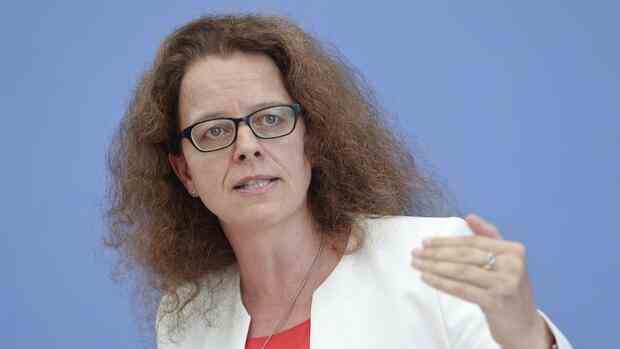The director of the ECB calls for more environmental awareness at the bank.
(Photo: imago images / Reiner Zensen)
Stockholm According to Executive Board member Isabel Schnabel, the European Central Bank (ECB) will have to raise interest rates much further. Although inflation in the euro area has fallen, it has only just returned to single-digit levels.
“Interest rates still need to rise significantly and steadily to reach levels that are sufficiently restrictive to ensure a timely return of inflation to our medium-term target of 2 percent,” Schnabel told a conference of Sweden’s Riksbank in Sweden on Tuesday Stockholm. “Inflation will not abate by itself.”
Headline inflation has reversed from last year’s records. The ECB councilors nevertheless insist that monetary policy must be tightened further in order to get the escalating core inflation under control. The latter reached a record high in December.
The ECB is helped by the fact that the current economic development is exceeding expectations. Investment bank Goldman Sachs has just updated its forecast for the euro zone and now assumes that a recession can be avoided.
Top jobs of the day
Find the best jobs now and
be notified by email.
Schnabel rejected criticism that higher interest rates are making the green transition in Europe more difficult by making the necessary investments more expensive. “While higher borrowing costs make it more expensive to finance renewable energy and green technology, it would be misleading to use higher interest rates as a scapegoat to further delay the green transition,” said the ECB governor.
ECB must become greener
Nevertheless, from the point of view of the director, the ECB must change in order to become greener in monetary policy. The measures taken so far have fallen short of the Paris climate targets, said Schnabel. They are not sufficient to ensure a decarbonization path consistent with carbon neutrality of the ECB’s operations by 2050.
>> Read also: Paradigm shift among investors – stocks are no longer without alternative, growth stocks are now unpopular
In particular, Schnabel is keeping an eye on the massive bond holdings of the ECB. “The Paris Agreement requires a stable decarbonization path in our portfolio, regardless of our monetary policy stance or companies’ individual steps,” she said. For example, the central bank should consider actively shifting the bond portfolio towards more environmentally friendly bond issuers.
In order to make the portfolio of government bonds greener, Schnabel mentioned two options. “One is to increase the proportion of bonds issued by supranational institutions and agencies.” Because a larger proportion of their bonds are already green. A second option is to shift government bond holdings towards more green government bonds as governments expand their supply of such paper.
More: Why interest-bearing securities will be interesting again in 2023
